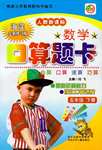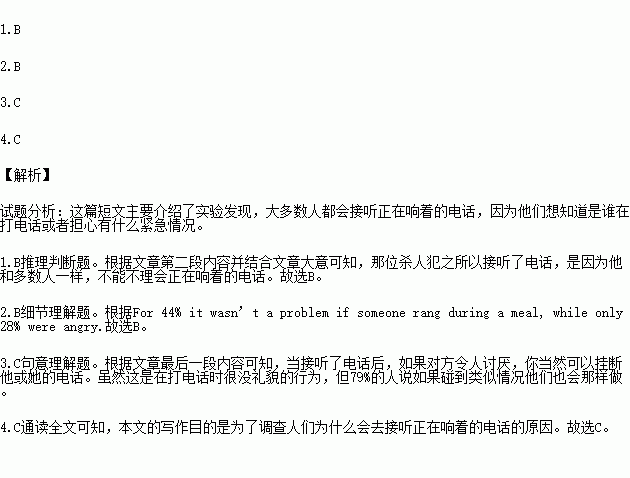题目内容
Most people will answer a ringing phone. Usually you don’t know who is phoning or how urgent their business is, so a ringing phone is difficult to ignore. In one experiment, a researcher wrote down the numbers of several public phones in stations and airports. Then he called the numbers. Someone nearly always answered. When he asked why, people usually said, “Because it rang.”
A few years ago in New Jersey, a man with a gun killed 13 people. Armed police surrounded his house but he refused to come out. A reporter found out the phone number of the house and called. The man put down his gun and answered the phone. “What do you want?” he said, “I’m really busy right now.”
Imagine you’re at work and the phone is ringing in someone else’s office. Do you answer it or not? In one survey on telephone use, 51% of participants(参与者) told researchers that they did. We can’t ignore the phone and for that reason, it forces its way into our lives. It interrupts(打扰) what we are doing and on top of that, the caller is often someone we don’t really want to talk to. However, in the survey, 58% said they never turned off the phone, and 67% didn’t mind if someone called during a television program. For 44% it wasn’t a problem if someone rang during a meal, while only 28% were angry. If someone phoned in the middle of the night, 40% told researchers that they got nervous or frightened, while around 30% got angry.
Of course, when someone is really angry, you can choose to hang up on them. This is in fact one of the rudest things you can do on the phone, but 79% said they were prepared to do it in some cases. Only 6% told researchers they never hung up on people.
1.The gunman answered the phone because ____.
A. he decided to give in to the police
B. it was difficult to ignore a ringing phone
C. he was angry at the ringing phone
D. he decided to be friendly with the media
2.How do people feel while someone rings during a meal?
A. 67% of the participants got angry.
B. 44% of the participants didn’t mind.
C. 40% of the participants got nervous or frightened.
D. 30% of the participants got angry.
3.What does the sentence “79% said they were prepared to do it in some cases” (in
the last paragraph) mean?
A. They were angry with the rude callers.
B. They were prepared to become those rude callers.
C. They were likely to hang up on annoying callers.
D. They never hung up on others because it was rude.
4.The purpose of the survey is to find out ____.
A. how the phone helps people’s work
B. what role the phone plays in people’s lives
C. why people mind a ringing phone sometimes
D. when the phone communication is more welcome
 培优口算题卡系列答案
培优口算题卡系列答案 开心口算题卡系列答案
开心口算题卡系列答案 口算题卡河北少年儿童出版社系列答案
口算题卡河北少年儿童出版社系列答案
